Where does your country stand on the Russia-Ukraine war?
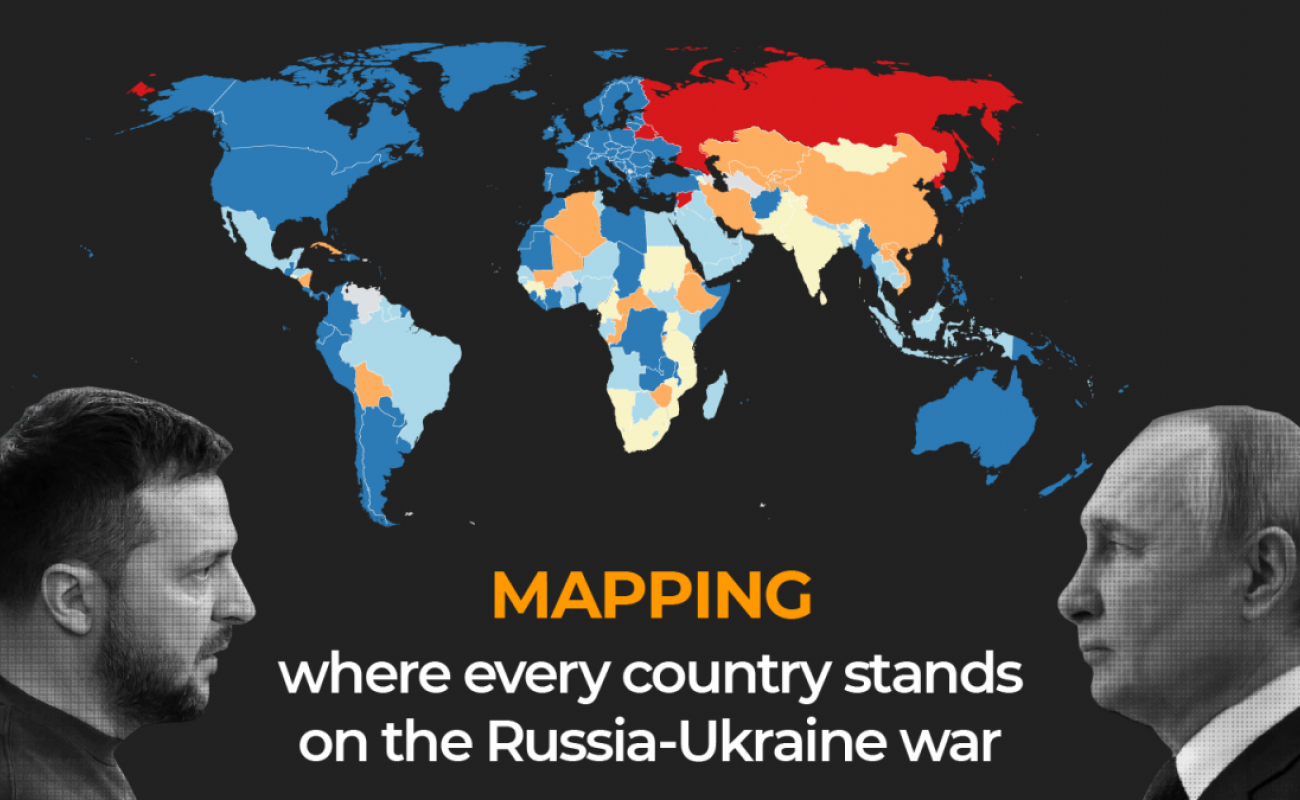
Since Russia’s invasion of Ukraine began nearly a year ago, the world has been broadly categorised into three camps – countries allied with Ukraine, those impartial to the conflict, and the nations that have defended Russia.
While the United States and European Union states have provided military assistance to Ukraine totalling more than $100bn, other countries have chosen to make their positions known by imposing sanctions on Russia or with their votes at the United Nations.
In the following series of infographics, Al Jazeera breaks down the political, military and economic positions of various countries.
Political stance
One way of knowing where a country stands politically is by looking at how they vote at the United Nations.
The United Nations General Assembly (UNGA) comprises 193 member states and is the most representative body of the UN system. Every member state is allowed an equal vote when deciding on resolutions.
Resolutions passed by the UNGA are non-binding, which means they have no legal power. Rather, they are viewed as an expression of the will of the international community on a given topic.
Following Russia’s invasion of Ukraine, the UN convened its first emergency session in 25 years. The 193-member assembly has since voted on four special resolutions addressing various concerns with regard to Ukraine.
The map below summarises how these countries voted across these four special resolutions.
Countries that voted in favour of all resolutions (102 countries):
Note: An asterisk* means this country was absent from at least one vote.
Afghanistan*, Albania, Andorra, Antigua and Barbuda, Argentina, Australia, Austria, Belgium, Benin*, Bosnia and Herzegovina, Bulgaria, Canada, Chad, Chile, Colombia, Comoros*, Costa Rica, Croatia, Cyprus, Czech Republic, DRC, Denmark, Djibouti*, Dominica*, Dominican Republic, East Timor, Ecuador, Estonia, Federated States of Micronesia, Fiji, Finland, France, Georgia, Germany, Greece, Grenada, Guatemala, Haiti, Hungary, Iceland, Ireland, Israel, Italy, Ivory Coast, Jamaica, Japan, Kiribati, Latvia, Lebanon*, Liberia, Libya, Liechtenstein, Lithuania, Luxembourg, Malawi, Malta, Marshall Islands, Mauritania*, Mauritius, Moldova, Monaco, Montenegro, Morocco*, Myanmar, Nauru, Netherlands, New Zealand, North Macedonia, Norway, Palau, Panama, Papua New Guinea, Paraguay, Peru, Philippines, Poland, Portugal, Romania, Rwanda*, Saint Lucia, Samoa, San Marino, São Tomé and Príncipe*, Serbia, Seychelles, Sierra Leone, Slovakia, Slovenia, Solomon Islands*, Somalia*, South Korea, Spain, Sweden, Switzerland, The Bahamas, Turkey, Tuvalu, Ukraine, United Kingdom, United States, Uruguay, Zambia*.
Countries that voted in favour or abstained in at least one resolution (47 countries):
Angola, Bahrain, Bangladesh, Barbados, Belize, Bhutan, Botswana, Brazil, Brunei, Cambodia, Cape Verde, Egypt, Ghana, Guinea-Bissau*, Guyana, Honduras, Indonesia, Iraq, Jordan, Kenya, Kuwait, Lesotho, Madagascar, Malaysia, Maldives, Mexico, Nepal, Niger, Nigeria, Oman, Qatar, Saint Kitts and Nevis, Saint Vincent and the Grenadines, Saudi Arabia, Senegal, Singapore, South Sudan, Suriname, Thailand, The Gambia, Togo*, Tonga, Trinidad and Tobago, Tunisia, United Arab Emirates, Vanuatu, Yemen.
Countries that voted to abstain in all resolutions (16 countries):
Armenia*, Cameroon*, El Salvador*, Equatorial Guinea*, Eswatini*, Guinea*, India, Mongolia, Mozambique, Namibia, Pakistan, South Africa, Sri Lanka, Sudan, Tanzania, Uganda.
Countries that voted against or abstained in at least one resolution (19 countries):
Algeria, Bolivia, Burundi, Central African Republic, Cuba, Eritrea, Ethiopia*, Iran*, Kazakhstan, Kyrgyzstan, Laos, Mali, Nicaragua, China, Republic of the Congo, Tajikistan, Uzbekistan*, Vietnam, Zimbabwe.
Countries that voted against all resolutions (4 countries):
Belarus, North Korea, Russia, Syria.
Countries that were absent in all resolutions (4 countries):
Azerbaijan, Burkina Faso, Turkmenistan, Venezuela.
Gabon was the only country to vote in favour or against a resolution.
A detailed breakdown of each of the resolutions is listed below:
Emergency Session 1 – Demand that Russia withdraw its military forces from Ukraine
In favour: 141 | Against: 5 | Abstain: 35
On March 2, 2022, 141 countries voted in favour of a UN resolution demanding that Russia “immediately, completely and unconditionally” withdraw its military forces from Ukraine. The resolution needed a two-thirds majority of yes/no votes to pass.
China, India, Iran and South Africa were among the 35 countries that abstained, while just five – Belarus, Eritrea, North Korea, Syria and of course Russia – voted against it. Twelve countries including Venezuela, which have been suspended for two years for failing to pay dues due to the UN, were absent from the vote.
Emergency Session 2 – Humanitarian consequences of the aggression against Ukraine
In favour: 140 | Against: 5 | Abstain: 38
In a second resolution adopted on March 24, almost three-quarters of the UNGA voted to demand aid access and civilian protection in Ukraine – and criticised Russia for creating a “dire” humanitarian situation.
The resolution, which was drafted by Ukraine and its allies, received 140 votes in favour and five votes against by the same countries – Belarus, Eritrea, North Korea, Russia and Syria – while 38 countries abstained. Ten countries were absent from the vote.
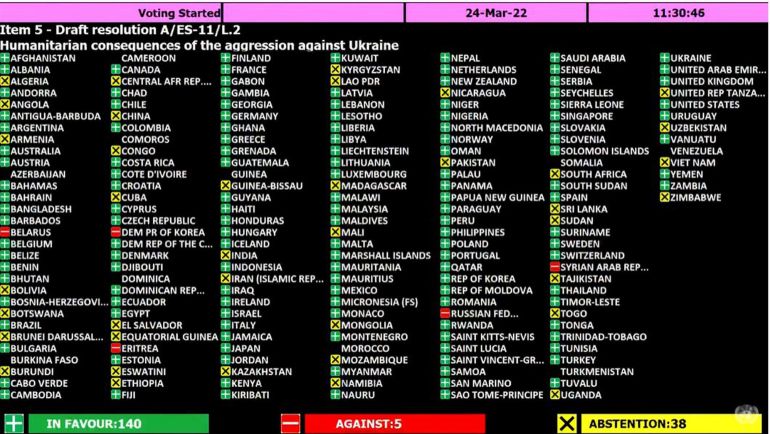
Emergency Session 3 – Suspending Russia from the UN Human Rights Council
In favour: 93 | Against: 24 | Abstain: 58
On April 7, a US-sponsored resolution to suspend Russia from the UN Human Rights Council (UNHRC) was adopted with 93 votes in favour, 24 against and 58 abstentions. The resolution required a two-thirds majority to pass, not counting abstentions.
The resolution came after the discovery of civilian bodies in the town of Bucha near Kyiv.
The Russian delegation announced it had quit the Human Rights Council earlier that day in expectation of the vote. The UNHRC is responsible for promoting and protecting human rights globally.
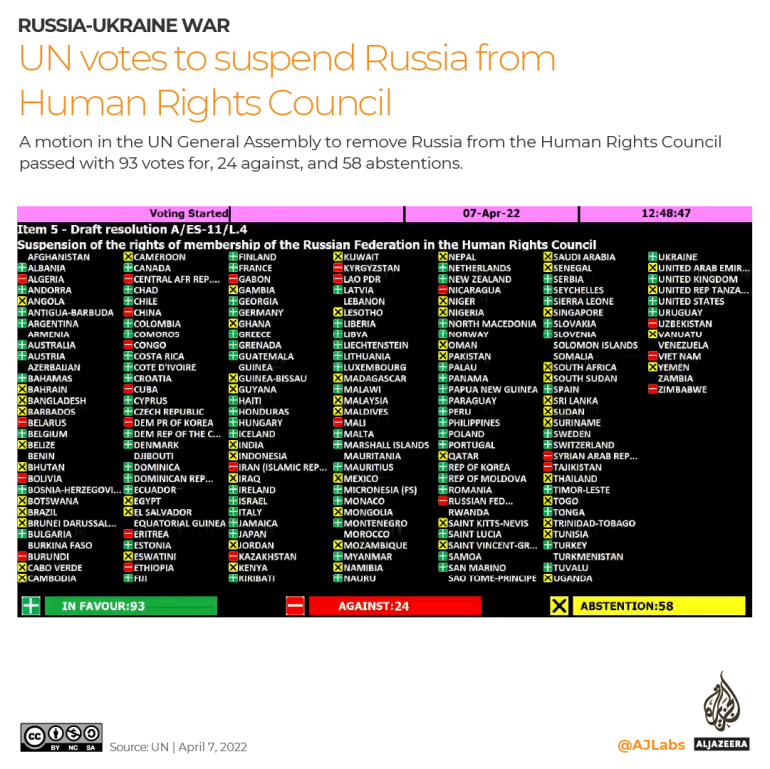
Emergency Session 4 – Territorial integrity of Ukraine, condemning Russia’s move to annex parts of Ukraine
In favour: 143 | Against: 5 | Abstain: 35
In late September, Russia formally announced the annexation of four partially occupied provinces of eastern and southern Ukraine. Kyiv and its Western allies rejected the vote as meaningless and illegal.
On October 12, the UN General Assembly voted to condemn Russia’s “attempted illegal annexation” of the four partially occupied regions in Ukraine and urged countries not to recognise the move. Three-quarters of the 193-member General Assembly — 143 countries — backed the resolution that also reaffirmed the sovereignty, independence, unity and territorial integrity of Ukraine within its internationally recognised borders.
Four countries joined Russia in voting against the resolution – Belarus, Nicaragua, North Korea and Syria. Another 35 countries abstained from the vote, including China, India, Pakistan and South Africa. The rest did not vote.
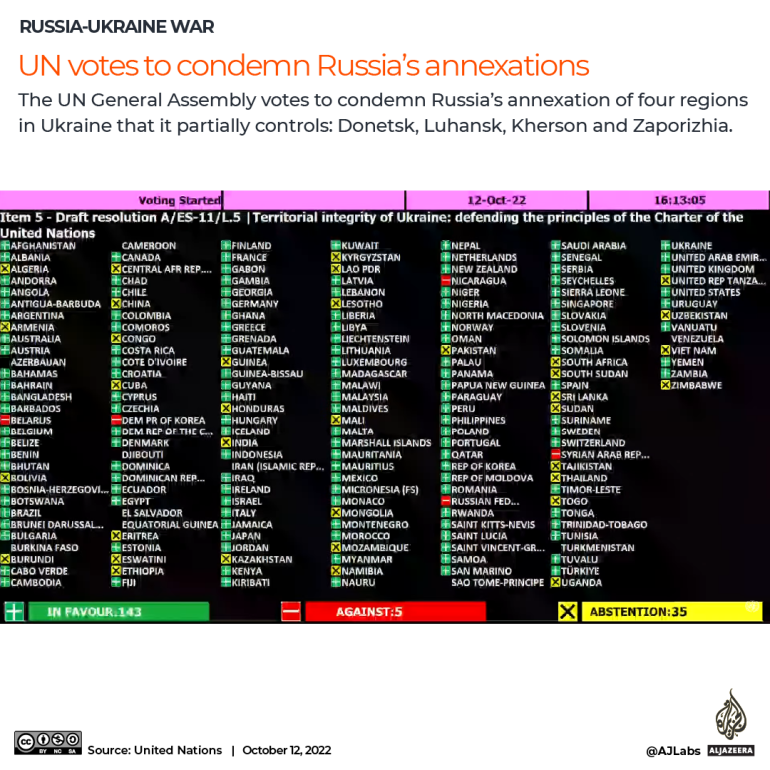
Countries arming Ukraine
According to the latest data from the Kiel Institute for the World Economy, a German think tank, at least 32 countries have provided Ukraine with military assistance including weapons, equipment or financial aid for the army.
Twenty-five of the 32 nations providing military assistance are part of NATO – the world’s largest military alliance with 30 member states. Notably missing from this list is Hungary, led by Prime Minister Viktor Orban, who has close relations with Russia.
Countries which have supplied Ukraine with weapons and military equipment include: Australia, Austria, Belgium, Bulgaria, Canada, Croatia, Czech Republic, Denmark, Estonia, Finland, France, Germany, Greece, Italy, Japan, Latvia, Lithuania, Luxembourg, Netherlands, New Zealand, Norway, Poland, Portugal, South Korea, Romania, Slovakia, Slovenia, Spain, Sweden, Turkey, the United Kingdom and the United States.
The list above does not include countries providing non-lethal aid or fuel. Some nations may have also kept their transfers secret.
Military aid sent to Ukraine includes conventional weapons as well as more advanced equipment and modern weaponry.
The weapons include artillery, anti-aircraft weapons, anti-tank weapons, armoured vehicles, reconnaissance and attack drones, helicopters, small arms, ammunition and body armour.
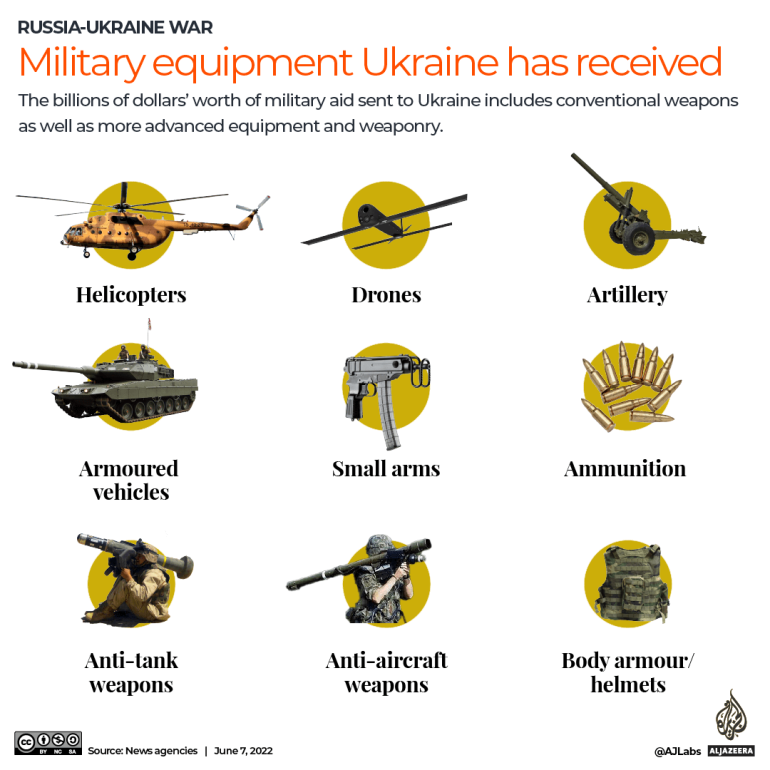
In January, the US, UK and Germany pledged to send modern main battle tanks to Ukraine. The UK said it would deliver 14 of its Challenger 2 tanks, Germany agreed to send 88 Leopard tanks, and the US said it would send dozens of its M1 Abrams to bolster the country’s war effort.
Analysts say the latest-generation main battle tanks are vital for Ukraine in order to punch holes in Russian defensive lines and retake territory that Moscow seized in the opening weeks of the invasion.
NATO and its allies have also trained tens of thousands of Ukrainian troops, including special forces.
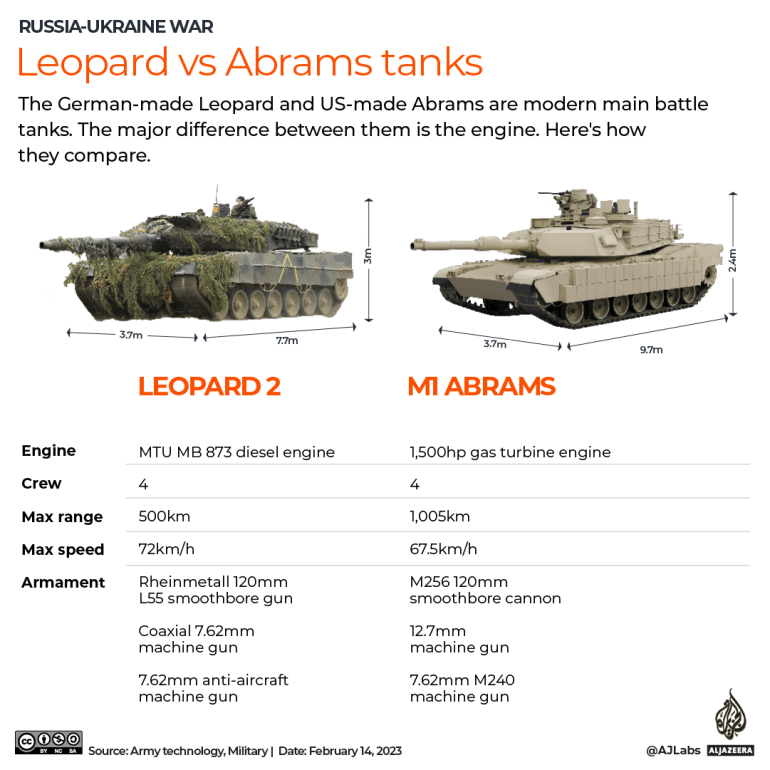
Countries providing aid to Ukraine
According to the Kiel Institute, 40 countries have committed at least 108bn euros ($115bn) in financial, humanitarian and military aid to Ukraine between January 24 and November 20, 2022.
At 47.8bn euros ($51.2bn) in commitments, the US is Ukraine’s biggest contributor, with at least 22.9bn euros ($24.5bn) going towards military pledges, 15.05 billion euros ($16.1bn) in financial aid and 9.9 billion euros ($10.6bn) in humanitarian assistance.
Humanitarian relief covers medical, food and other items for civilians, while financial assistance comes in the form of grants, loans and guarantees.
European Union institutions including the EU Commission, EU Council and the European Investment Bank, are the second-highest contributors with 34.9bn euros ($37.3bn) pledged to Ukraine, while the UK is third at 7.1bn euros ($7.6bn).
Since November 20, the US and other countries have pledged additional military packages to Ukraine. The chart below provides a detailed breakdown of how much each country has committed to Ukraine.
Countries sanctioning Russia
At least 46 countries or territories have imposed sanctions on Russia, or pledged to adopt a combination of US and EU sanctions according to Castellum.ai, a global sanctions-tracking database. Since February 22, more than 11,327 sanctions have been slapped on Moscow, making Russia the most sanctioned country in the world.
Eighty percent of all sanctions target individuals while 18 percent target entities. The remaining sanctions target vessels and aircraft.
The US has imposed the most number of sanctions on Russia at 1,948 followed by Switzerland (1,782), Canada (1,590), the UK (1,429) and the EU (1,390).
